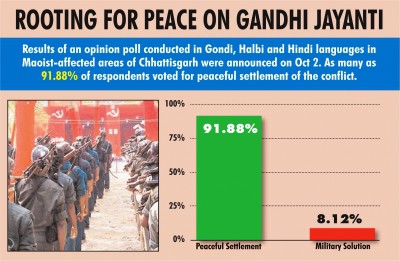Raipur/New Delhi: At least 92 per cent people in the Red Terror areas of Chhattisgarh have voted in favour of dialogue to end Maoist violence in the state.
The results of a public opinion poll conducted in Gondi, Halbi and Hindi languages, were announced on Gandhi Jayanti today.
The survey over phone was held by ‘New Peace Process’ (NPP), an initiative headed by Shubranshu Choudhary, a peace and human rights activist who has been working with tribals in Chhattisgarh for decades. The poll began on the 74th Independence Day on August 15 this year.
In a statement, Choudhary said, “On Gandhi Jayanti, the people of India have spoken out loudly in favour of peace.”
In response to a survey question, 91.88 per cent people in Chhattisgarh’s tribal areas said that solution to the Maoist conflict will come through talks. Only 8.12 per cent people said that the problem can be sorted out using military force.
The NPP statement said 3,760 people voted in the poll, with 76 per cent people in Hindi, 18 per cent in Gondi and 6 per cent in Halbi.
Kamlesh Kashyap from Vikaskhand Tokupal (Bastar) said he voted for peace. In his recorded message in Halbi, he said, “Educated and aware people will have to come forward and only then will there be peace.” Gangaram Barse spoke in Gondi from Kakalgur, Darbha (Bastar), “Both sides have to overcome differences and talk about how to bring peace in Bastar.”
Saite Dugga in Gondi said, “Police, people and Naxals have to come on one platform; Bastar needs peace.” Masuram Poyam, who spoke in Hindi from Badekilepal village in Bastanar (Bastar) shared similar views.
Apart from announcing the results of the poll today, the NPP also conducted Bastar Dialogue 6 with participants from Nepal, Philippines, Colombia and Andhra Pradesh.
Lisa Cuartas, alumni of Universidad Pontificia Bolivariana and an expert in peace building, while talking about the peace process in Colombia pointed out that the Havana talks produced an agreement that covered land distribution, political participation of Maoists, reparations for victims of police and Maoist violence, and implementation and verification.
Marcela Lopez, an advocate and expert in post-conflict peace-building, said it is important to “decide a budget and alliances for a peace process, provide legal security to those laying down arms and have a communication strategy that prepares, educates and listens to the entire society.”
Dr. Emma Leslie, founder director of the Centre for Peace and Conflict Studies, underscored the importance of the feminist model of mediation where not just those with guns but also leaders working on systemic violence and injustice have a voice that is amplified by social media.
Anant Maringati, one of the 15 CCC (Concerned Citizens Committee) members of the 2004 peace process with Maoists in Andhra Pradesh, reiterated Emma’s point, “People are now asking for justice, fairness and recognition of their identity, which is different from the Maoists earlier focus on economic concerns.”
The NPP also launched the first unicode font for Gondi (tiny.cc/masaram), which would make available the option of typing in Gondi script for Android 11 operating systems and above.
Disclaimer: This story is auto-generated from IANS service.

